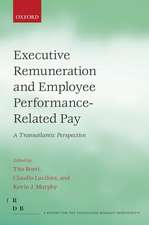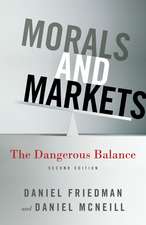Corporate China 2.0: The Great Shakeup
Autor Qiao Liuen Limba Engleză Paperback – 24 dec 2016
| Toate formatele și edițiile | Preț | Express |
|---|---|---|
| Paperback (1) | 389.70 lei 6-8 săpt. | |
| Palgrave Macmillan US – 24 dec 2016 | 389.70 lei 6-8 săpt. | |
| Hardback (1) | 395.47 lei 6-8 săpt. | |
| Palgrave Macmillan US – 24 dec 2016 | 395.47 lei 6-8 săpt. |
Preț: 389.70 lei
Nou
Puncte Express: 585
Preț estimativ în valută:
74.57€ • 78.06$ • 61.70£
74.57€ • 78.06$ • 61.70£
Carte tipărită la comandă
Livrare economică 05-19 aprilie
Preluare comenzi: 021 569.72.76
Specificații
ISBN-13: 9781137603722
ISBN-10: 1137603720
Pagini: 272
Ilustrații: XXXII, 243 p. 35 illus., 20 illus. in color.
Dimensiuni: 148 x 210 x 17 mm
Greutate: 0.45 kg
Ediția:1st ed. 2016
Editura: Palgrave Macmillan US
Colecția Palgrave Macmillan
Locul publicării:New York, United States
ISBN-10: 1137603720
Pagini: 272
Ilustrații: XXXII, 243 p. 35 illus., 20 illus. in color.
Dimensiuni: 148 x 210 x 17 mm
Greutate: 0.45 kg
Ediția:1st ed. 2016
Editura: Palgrave Macmillan US
Colecția Palgrave Macmillan
Locul publicării:New York, United States
Cuprins
1. The Improbably Surge of Corporate China.- 2. What Is in a Great Company?.- 3. Does ROIC Apply to Corporate China?.- 4. The “Great” Hope Struggles.- 5. It Is Also About Corporate Governance.- 6. The Perils of Diversification.- 7. Shake up the Foundations.- 8. The Beginning of A Breakthrough.- 9.Conclusion - How Can Chinese Companies Be Truly Great?.
Notă biografică
Qiao Liu is Professor of Finance and Associate Dean for the EMBA program in the Guanghua School of Management, Peking University, China. Formerly, he was a corporate finance expert at McKinsey. He has published numerous articles at leading academic journals including Journal of Financial Economics, Journal of Financial and Quantitative Analysis, Management Science, Journal of Accounting Research, and Economic Journal. He is co-author of the book Finance in Asia: Institutions, Regulation and Policy.
Textul de pe ultima copertă
This book argues that that the rise of great firms — those with sustainable high return on invested capital (ROIC) — will lay the foundation for China’s successful economic transformation. Drawn from the author’s research on corporate finance and the Chinese economy, the author maintains that being big could be easy but means little for corporate China, especially in the context of China’s transition from an investment-led economy to an efficiency-driven one. The work discusses both internal and external impediments that lead to lack of great companies in China and suggests institutional conditions which foster the rise of great companies in China, including, reversing the government’s obsession with GDP, reforming the financial system, and promoting entrepreneurship. Policy makers, investors, corporate executives, and MBA students and scholars will appreciate case studies of Huawei, Alibaba, Xiaomi, and Lenovo, among others, that illustrate the endeavors made by Chinese entrepreneurs at the grassroots level and highlight what makes successful companies in China.
Caracteristici
First book of its kind to extensively use examples of state-owned enterprises, private companies, and new economy companies in China to illustrate the importance of enhancing return on capital to China’s ongoing economic transition Differs in design from typical treatments of corporate finance and strategies by (i) taking a contemporary and forward-looking view of corporate China, (ii) detailing China-specific institutional framework which determines corporate behavior, and subsequently, corporate performance, (iii) discussing institutional reforms necessary for China to boast great companies, and mapping out potential routes, and (iv) using a wide range of Chinese firms as case examples Provides valuable insights about companies in China through rigorous analysis and compelling case studies












